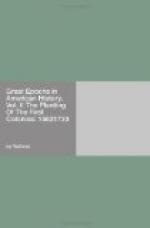But now haueing some leasure to discourse of the motiues for other mens comeinge to this place or their abstaining from it, after my brief manner I say this—That if any come hether [hither] to plant for worldly ends that canne live well at home hee co[m]mits an errour of which hee will soon repent him. But if for spirittuall [ends] and that noe particular obstacle hinder his removeall, he may finde here what may well content him: vizt: materialls to build, fewell [fuel] to burn, ground to plant, seas and rivers to ffish in, a pure ayer [air] to breath[e] in, good water to drinke till wine or beare canne be made, which togeather with the cowes, hoggs and goates brought hether allready may suffice for food, for as for foule [fowl] and venison, they are dainties here a well as in England. Ffor cloaths and beddinge they must bring them with them till time and industry produce them here. In a word, wee yett enioy [enjoy] little to bee envyed but endure much to be pittyed in the sicknes & mortalitye of our people.
[1] From Dudley’s letter
to the Countess of London. Printed in
Hart’s “Source
Book of American History.” Dudley came over
with
Winthrop, and at one time
was governor of the Colony.
[2] Boston Harbor is here referred to.
[3] The place was alterward called Newtown, and is now Cambridge.
HOW THE BAY COLONY DIFFERED FROM PLYMOUTH
BY JOHN G. PALFREY[1]
The emigration of the Englishmen who settled at Plymouth had been prompted by religious dissent. In what manner Robinson, who was capable of speculating on political tendencies, or Brewster, whose early position had compelled him to observe them, had augured concerning the prospect of public affairs in their native country, no record tells; while the rustics of the Scrooby congregation, who fled from a government which denied them liberty in their devotions, could have had but little knowledge and no agency in the political sphere. The case was widely different with the founders of the Colony of Massachusetts Bay. That settlement had its rise in a state of things in England which associated religion and politics in an intimate alliance....
Winthrop, then forty-two years old, was descended from a family of good condition, long seated at Groton, in Suffolk, where he had a property of six or seven hundred pounds a year, the equivalent of at least two thousand pounds at the present day. His father was a lawyer and magistrate. Commanding uncommon respect and confidence from an early age, he had moved in the circles where the highest matters of English policy were discust, by men who had been associates of Whitgift, Bacon, Essex, and Cecil. Humphrey was “a gentleman of special parts, of learning and activity, and a godly man”; in the home of his father-in-law, Thomas, third earl of Lincoln, the head in that day of the now ducal house of Newcastle, he had been the familiar companion of the patriotic nobles.




